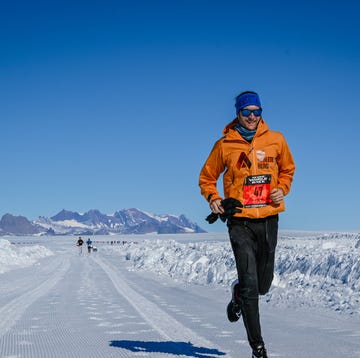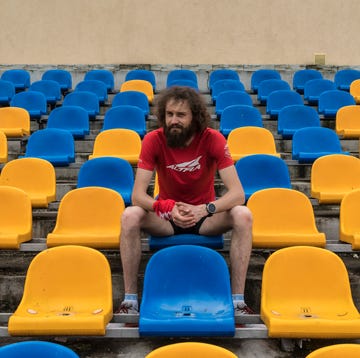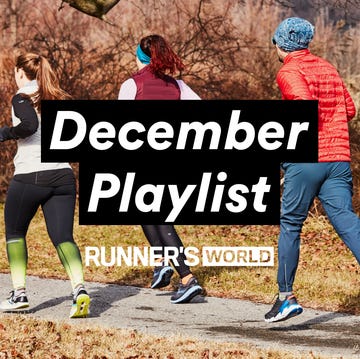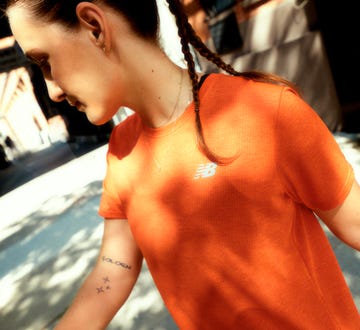Kim “Rooster” Rossiter wasn’t a runner before 2008. He was—and still is—an active duty Marine and a big guy at 6-foot-1 and 225 pounds. He liked to lift weights, and in his younger days, he was a baseball pitcher and in high school, a varsity football lineman.
Running was something he did only when the Marines required it: twice a year, for physical fitness tests. “By no means was running my strong suit or something I went out and did for leisurely fun,” he says.
That changed one August day nine years ago. The middle born of his three children, Ainsley, who was nearly 5, completely upended the way he felt about running.
Shattering News
Rossiter was deployed in Iraq, and Ainsley was about 15 months old when his wife, Lori, first expressed concerns about Ainsley’s development in a letter to him. Doctors were mystified.
As they would later find out, Ainsley was born with an extremely rare genetic disorder called Infantile Neuroaxonal Dystrophy (INAD), which affected her nervous system—and is always fatal. The disease, as Rossiter explains, caused toxins to build up in her nervous system and gradually began to affect her ability to move. But it took two years and dozens of tests before they had a clear sense of what they were facing.
And when the word came, in 2007, Rossiter was again deployed. Lori contacted his unit and asked for him to call home so she could share the devastating news. “When we got the diagnosis, with it came the ‘terminal’ tag,” Rossiter says, “and the fact that she would live to be 5 to 10 years old. It hit like a ton of bricks.” At the time of Ainsley’s diagnosis, which came when she was 3, she was one of seven children in the country with the condition.
It was another month before his deployment ended. After Rossiter came home, the family moved from North Carolina to Hampton Roads, Virginia, where Ainsley could be most comfortable and the family gained stability. And there, they discovered the joy of wheels along the ocean.
By 2008, when Rossiter joined Ainsley on that first run, she was unable to move much, but the feeling of the ocean breeze on her face that came with the rush of speed made her face light up.
“We knew that day that this was going to be something we kept doing, because Ainsley enjoyed running,” Rossiter says. “That started it. I became a runner for my daughter.”
Influencer Apologizes for E-Bikes on NYC Course
Rossiter’s older daughter, Briley, had dance. His son, Kamden, had hockey. And Ainsley had running. The miles together were something the family could share. And as the years went on, people saw the fun they were having and wanted to join in. “It became pretty clear that this was something others should benefit from,” Rossiter says. “We wanted to spread it.”
That’s how Ainsley’s Angels of America was born. In 2011, Rossiter and his sister, Kristine, filed paperwork to create the nonprofit. By the summer of 2012, Ainsley’s Angels was hosting its first inclusive running events outside of Virginia, in Louisiana and North Carolina. The group’s mission: ensuring everyone can experience endurance sports while building awareness about the country’s special needs community.
Now, Rossiter is the president of Ainsley’s Angels, which has ambassadorships in more than 60 cities and 30 states. Growing daily, the charity has a registered membership of more than 10,000 people who are either angel runners, athlete riders, or guardian angels, who help the runner-rider pairings. The teams participate in workouts and races all over the country, bringing the joy of running to riders ranging in age from 18 months to older than 80. The riders, in turn, bring fresh inspiration to runners. “When you have something that is so pure, and so many people who can find the positives and can be a light, it’s pretty doggone awesome how it grows,” he says.
Health & Injuries
Ainsley Rossiter—whose love of running ultimately brought the joy of the sport to thousands of others with special needs—far outlived doctors’ predictions for her. On February 23, 2016, she died at home, at the age of 12.
“I am proud of my daughter for having the courage to rest, because she had fought for so long and fought a great fight,” Rossiter said shortly after her death.
In the weeks before Ainsley died, Rossiter had started a daily run streak, which continues, and passed two years on December 24. The requirements: one mile, faster than 11 minutes, no treadmills. “Get your tail outside and enjoy it,” he says. Every day of his run streak has been in HOKA shoes, which he first tried in 2014 at a running store in Louisiana.
“Initially I became a runner for Ainsley,” Rossiter, now 41, says. “I got to a point where I absolutely enjoy and cherish the opportunity and the ability to run. How can you not enjoy something that you are so fortunate to have the ability to do?
“Today, if you asked me why I run, I would say, ‘I run because I have the ability to do so,’” he continues. “My intention is to run every day for the rest of my life so long as I’m able. And even then, I’ve dedicated my life to the world of running, so that everyone I come in contact with can also have this opportunity.”
As Ainsley’s Angels of America shows, he’s well on his way.

















